

Grammar


Tenses


Present

Present Simple

Present Continuous

Present Perfect

Present Perfect Continuous


Past

Past Simple

Past Continuous

Past Perfect

Past Perfect Continuous


Future

Future Simple

Future Continuous

Future Perfect

Future Perfect Continuous


Parts Of Speech


Nouns

Countable and uncountable nouns

Verbal nouns

Singular and Plural nouns

Proper nouns

Nouns gender

Nouns definition

Concrete nouns

Abstract nouns

Common nouns

Collective nouns

Definition Of Nouns

Animate and Inanimate nouns

Nouns


Verbs

Stative and dynamic verbs

Finite and nonfinite verbs

To be verbs

Transitive and intransitive verbs

Auxiliary verbs

Modal verbs

Regular and irregular verbs

Action verbs

Verbs


Adverbs

Relative adverbs

Interrogative adverbs

Adverbs of time

Adverbs of place

Adverbs of reason

Adverbs of quantity

Adverbs of manner

Adverbs of frequency

Adverbs of affirmation

Adverbs


Adjectives

Quantitative adjective

Proper adjective

Possessive adjective

Numeral adjective

Interrogative adjective

Distributive adjective

Descriptive adjective

Demonstrative adjective


Pronouns

Subject pronoun

Relative pronoun

Reflexive pronoun

Reciprocal pronoun

Possessive pronoun

Personal pronoun

Interrogative pronoun

Indefinite pronoun

Emphatic pronoun

Distributive pronoun

Demonstrative pronoun

Pronouns


Pre Position


Preposition by function

Time preposition

Reason preposition

Possession preposition

Place preposition

Phrases preposition

Origin preposition

Measure preposition

Direction preposition

Contrast preposition

Agent preposition


Preposition by construction

Simple preposition

Phrase preposition

Double preposition

Compound preposition

prepositions


Conjunctions

Subordinating conjunction

Correlative conjunction

Coordinating conjunction

Conjunctive adverbs

conjunctions


Interjections

Express calling interjection

Phrases

Sentences

Clauses

Part of Speech


Grammar Rules

Passive and Active

Preference

Requests and offers

wishes

Be used to

Some and any

Could have done

Describing people

Giving advices

Possession

Comparative and superlative

Giving Reason

Making Suggestions

Apologizing

Forming questions

Since and for

Directions

Obligation

Adverbials

invitation

Articles

Imaginary condition

Zero conditional

First conditional

Second conditional

Third conditional

Reported speech

Demonstratives

Determiners

Direct and Indirect speech


Linguistics

Phonetics

Phonology

Linguistics fields

Syntax

Morphology

Semantics

pragmatics

History

Writing

Grammar

Phonetics and Phonology

Semiotics


Reading Comprehension

Elementary

Intermediate

Advanced


Teaching Methods

Teaching Strategies

Assessment
Sea or Land
المؤلف:
L.A Hill
المصدر:
Elementary Anecdotes In American English
الجزء والصفحة:
66-1
10/10/2022
2318
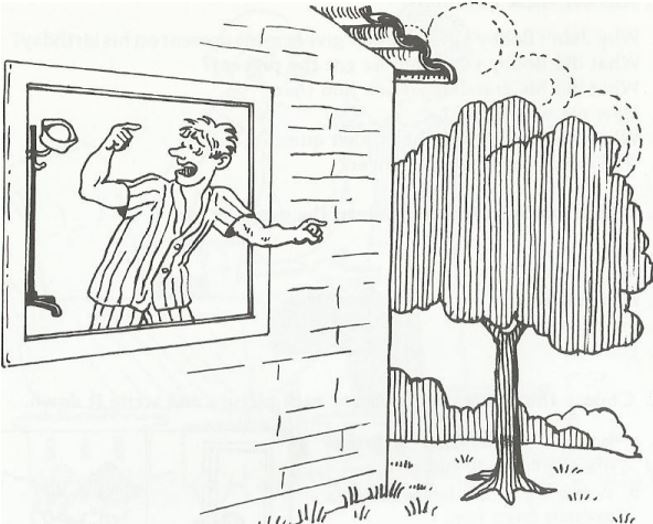
Dick was a sailor o a big ship. It went to Japan and Australia, so Dick was often on the ship for several months at a time. When he woke up in the morning and looked out, he only saw the sea, or sometimes a port.
When he was twenty-three, Dick got married and bought a small house with a garden in his wife's town. It was far away from the sea. Then he had to go back to his ship, and he did not come home for two months. He went from the port to the town by bus, and was very happy to see his wife again.
The next morning he slept until 9 o'clock. Then he woke up suddenly and looked out of the window. There were trees a few feet away. He was very frightened and jumped out of bed, shouting, "We've hit land!"
A Answer these questions:
- What kind of work did Dick do?
- What did he usually see when he woke up and looked out?
- Where did he buy a house?
- What did he see when he woke up in his house and looked out?
- What did he do then?
- What did he say?
B Which of these sentences are true? Write down the correct ones.
- Dick's ship made long trips.
- Dick never saw the land during these trips.
- He bought a house near the sea.
- He left his wife for two months.
- When his ship came back, he went to a hotel in the port.
- He woke up in a forest with trees around him.
- He was afraid when he saw the trees.
- He thought, "I'm on the ship, and it has hit land!"
C Write this story using words instead of pictures.
Dick had a friend. His name was George, and he was a 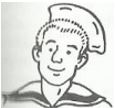 too. He worked in a
too. He worked in a 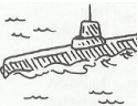 for a long time. Then Dick did not see him for two years.
for a long time. Then Dick did not see him for two years.
When they 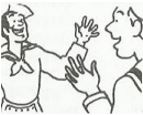 again, George was learning to fly an
again, George was learning to fly an  . Dick was
. Dick was  , but George said, "Well, when things go
, but George said, "Well, when things go  , they always come
, they always come 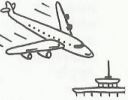 again; but sometimes things go
again; but sometimes things go  and don't come
and don't come  again!
again!
 الاكثر قراءة في Elementary
الاكثر قراءة في Elementary
 اخر الاخبار
اخر الاخبار
اخبار العتبة العباسية المقدسة

الآخبار الصحية















 قسم الشؤون الفكرية يصدر كتاباً يوثق تاريخ السدانة في العتبة العباسية المقدسة
قسم الشؤون الفكرية يصدر كتاباً يوثق تاريخ السدانة في العتبة العباسية المقدسة "المهمة".. إصدار قصصي يوثّق القصص الفائزة في مسابقة فتوى الدفاع المقدسة للقصة القصيرة
"المهمة".. إصدار قصصي يوثّق القصص الفائزة في مسابقة فتوى الدفاع المقدسة للقصة القصيرة (نوافذ).. إصدار أدبي يوثق القصص الفائزة في مسابقة الإمام العسكري (عليه السلام)
(نوافذ).. إصدار أدبي يوثق القصص الفائزة في مسابقة الإمام العسكري (عليه السلام)


















